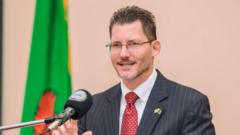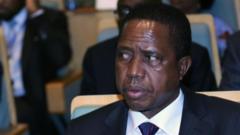The US embassy cites corruption and the sale of donated medications as key issues leading to this decision.
US Slashes $50M Health Aid to Zambia Amidst Drug Theft Concerns

US Slashes $50M Health Aid to Zambia Amidst Drug Theft Concerns
Zambia faces a significant reduction in US aid as systematic theft of medical supplies remains unaddressed.
The United States has announced a substantial cut of $50 million (£37 million) in aid to Zambia's health sector, a decision driven by the country’s failure to tackle the pervasive issue of “systematic theft” of donated medicines and medical supplies. US Ambassador to Zambia, Michael Gonzales, described the reduction as a “difficult” yet necessary response to the Zambian government’s inaction concerning the safeguarding of essential drugs intended for the most vulnerable populations.
Gonzales emphasized that the US can no longer support a system where funds contribute to the enrichment of corrupt individuals while patients are left to either go without or pay for vital medications that should be freely available. The Zambian government has yet to issue a response to this funding halt, which is separate from the broader foreign aid freeze imposed by former President Donald Trump earlier this year.
Foreign donors play a crucial role in funding Zambia’s health sector, with the US accounting for approximately one-third of public health expenditure in the country. However, previous reports have illuminated widespread corruption and misappropriation within the health ministry, leading to shocking findings during a year-long investigation by the US embassy.
Over 2,000 pharmacies across Zambia were discovered to be selling donated drugs, with a staggering 95% of those visited either directly involved in the sale of stolen medical supplies or connected to medications intended for free distribution. Other vendors were found to be selling stolen drugs procured from the Zambian government and various donor programs.
Despite the US embassy presenting its findings and offering expertise in stopping such theft and achieving accountability as early as April last year, the Zambian authorities have yet to take substantial action. Gonzales lamented the government's inadequate commitment to protecting US aid and the lives it aims to support, noting that law enforcement efforts have primarily targeted low-level offenders rather than addressing the masterminds behind these illicit activities.
As the decision is poised to impact drug availability for essential treatments such as HIV, TB, and malaria, Gonzales expressed deep concern for the fallout among Zambian patients. The cuts will take effect in January, designed to allow the Zambian government time to establish alternative resources; however, he emphasized that the choice to reduce aid has been firmly established.
Since the Trump administration's entry into office, global health programs have faced significant financial cuts, disproportionately affecting African countries like Zambia, where HIV remains a critical public health challenge, particularly among the youth. In a statement earlier this year, Zambian President Hakainde Hichilema remarked that the financial measures enforced by Trump were akin to receiving a “slap” on both cheeks, urging a national effort to bolster its treasury to procure medicines independently.
Gonzales emphasized that the US can no longer support a system where funds contribute to the enrichment of corrupt individuals while patients are left to either go without or pay for vital medications that should be freely available. The Zambian government has yet to issue a response to this funding halt, which is separate from the broader foreign aid freeze imposed by former President Donald Trump earlier this year.
Foreign donors play a crucial role in funding Zambia’s health sector, with the US accounting for approximately one-third of public health expenditure in the country. However, previous reports have illuminated widespread corruption and misappropriation within the health ministry, leading to shocking findings during a year-long investigation by the US embassy.
Over 2,000 pharmacies across Zambia were discovered to be selling donated drugs, with a staggering 95% of those visited either directly involved in the sale of stolen medical supplies or connected to medications intended for free distribution. Other vendors were found to be selling stolen drugs procured from the Zambian government and various donor programs.
Despite the US embassy presenting its findings and offering expertise in stopping such theft and achieving accountability as early as April last year, the Zambian authorities have yet to take substantial action. Gonzales lamented the government's inadequate commitment to protecting US aid and the lives it aims to support, noting that law enforcement efforts have primarily targeted low-level offenders rather than addressing the masterminds behind these illicit activities.
As the decision is poised to impact drug availability for essential treatments such as HIV, TB, and malaria, Gonzales expressed deep concern for the fallout among Zambian patients. The cuts will take effect in January, designed to allow the Zambian government time to establish alternative resources; however, he emphasized that the choice to reduce aid has been firmly established.
Since the Trump administration's entry into office, global health programs have faced significant financial cuts, disproportionately affecting African countries like Zambia, where HIV remains a critical public health challenge, particularly among the youth. In a statement earlier this year, Zambian President Hakainde Hichilema remarked that the financial measures enforced by Trump were akin to receiving a “slap” on both cheeks, urging a national effort to bolster its treasury to procure medicines independently.




















